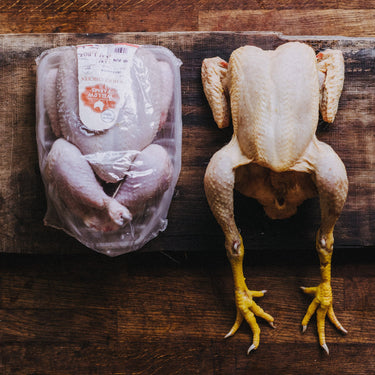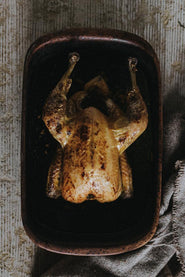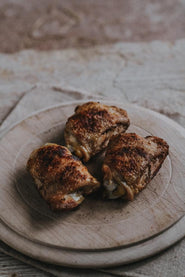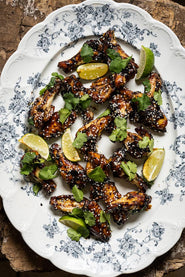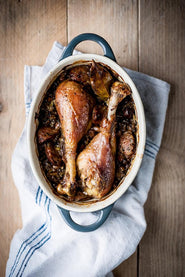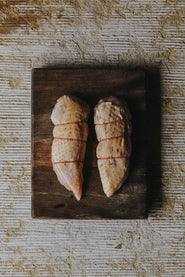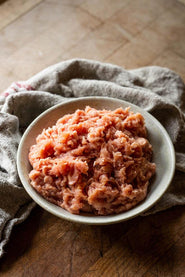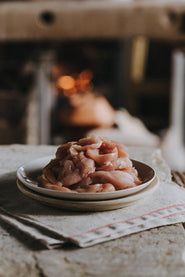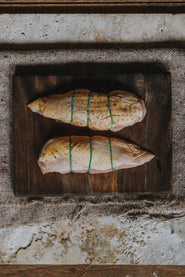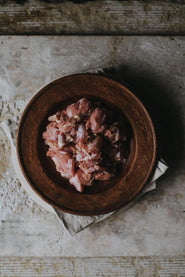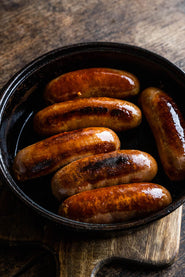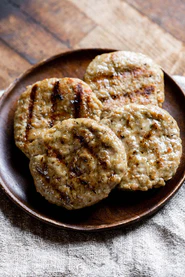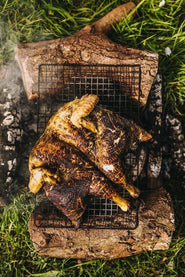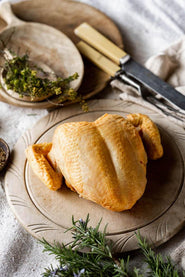Chicken is a tricky one. Once plucked and prepared, there are few clues to guide you to a good bird. Food labels offer a good starting point, but truth is they can only tell you so much, and whether its Red Tractor, RSPCA Assured or Organic, standards can vary wildly within each bracket.
The meat industry can be confusing to say the least, and at worst it can also be horribly corrupt. Buying straight from the producer, or as close as you can get, is the best way to navigate your way to good food produced with respect for animal, environment and consumer.

What is the difference between an industrial chicken and a Pipers Farm chicken?
An industrial chicken is a highly bred creature. Plastered with patents and designed with profit in mind, it’s no exaggeration to say that theirs is a troubled existence.
They are typically bred to be ready for slaughter within 28-35 days, compared with 70-80 days for a Pipers Farm bird.
This rapid growth puts an enormous strain on the body of the bird, especially when they have been selected with an emphasis on breast meat, which their immature legs and heart often just don’t have the strength to support. A recent study found that 57% of chickens reared in industrial systems had severe walking problems.
Animal welfare aside, this also has a big impact in the kitchen. Fine wine, cheddar and men all improve with age, and the same applies to chickens. As many of our customers comment, ironically as a famous supermarket known for some of the worst industrial chicken, originally coined 'you can taste the difference'.
Our beautiful birds are French Hubbards, a robust breed that thrives in our truly outdoors farming system. With triple the time for maturation, the meat, marrow and bones all bring more to the table.
The Freedom
90% of all chickens reared in the UK for meat are kept indoors - in large scale, automated factory units which can hold hundreds of thousands of birds. Only 8% of birds are reared in a 'free range' system and just 2% are reared as 'organic'.
You'll notice we do not use any marketing labels for our birds, there’s free-range, and then there’s Pipers Farm - Properly Free Range.
The UK farming standards legally required to label a bird as 'free range' are surprisingly low, with birds only required to have access to the outdoors for half their lives. Some may be kept in barns with natural light, and be given 'enrichment devices' such as perches and pecking objects, but it is not a requirement.
In contrast, the starting point for the way we rear our poultry, is the life we want to give our birds, not the minimum gestures required to tick some boxes on a form. There's no box that asks whether the birds are happy, healthy, nutritious and delicious. Until such vital requirements are included in labelling schemes, we would rather keep out of it and instead focus our energy on what happens on the farm and on our plates.
Free to forage, dust bathe, venture and unfurl their feathers, Pipers Farm birds have acres to explore with grass under their feet as soon as they are big enough to go outside. We dot shelters around the fields to encourage them to explore (they like having a bit of cover) all of which adds up to a healthy bird with a robust bone structure and tendons, and ultimately contributes to the nutritional value of the resulting meat and bone broths.
Of equal importance is that we move our chicken sheds from field to field. This was always standard practice in the past, as no matter how careful your farming, keeping birds in once place causes soil erosion and disease build-up. In contrast, as we rotate the fields we rear our birds on, the soil has time to recover and we have no problems with diseases like Campylobacter. Our birds are simply happier creatures too. Once you see the relish with which a chicken gobbles up a juicy worm or chases a passing bug, it’s difficult to imagine how a life in a soulless indoor system compares.

The Food
Industrial birds eat grey nuts. Homogenised ground up feed made of up to 70% soya. The feed is fine tuned to get growth galloping, it’s a formula that has as little regard for the environment as it does for the true wellbeing of the bird.
Industrial feed is brimming with soy and chemical inputs, as they pack the protein punch industrial birds require to grow fast. Not to mention, in addition to this rocket fuel, the cocktail of antibiotics they are routinely given to keep them alive.
Meanwhile our flocks forage for insects, grasses and legumes among the lush pastures and feast on a varied diet of wholegrain cereals and proteins.
Chickens are monogastric animals, which means they can’t survive on pasture alone – their stomach systems are not sophisticated enough to extract the energy and protein they need. This means whilst our chickens enjoy a high proportion of their diet from pasture, nutrient-packed grains and proteins are a also a crucial part of their diet in order to maintain happy healthy birds that can survive a life outside in all weathers.
It is important to be aware that, except for our seasonal, Pastured Chickens, our chickens are not soy free. We use the minimum amount possible (less than 5% of their feed) to ensure the welfare of our chickens, this protein is crucial for our birds to thrive while living a properly free range life.
Our Pastured Chickens are reared on a farm that have removed soy from the diet entirely, replacing it with peas and beans to provide the necessary protein. In this case, the soy is not required, simply as the Pastured Chickens are grown for a limited season, over the warmer months only, with significantly less challenges and therefore less of a requirement for the protein supplement.
The Finish
The way an animal is handled at slaughter and how the carcass is treated subsequently has a huge impact on the meat. Ours don’t even leave the farm they are reared on for this stage – it’s all handled quietly and calmly by the same people who rear the animals. Without the need for travel it reduces the carbon footprint of the meat and cuts out the stress that would otherwise come to the birds at this stage.
The animals are stunned at a low pace and by hand, and care is taken to ensure that every bird goes through the stunner (an electrified tank of water) for the correct length of time. All the giblets are included when we deliver your whole bird.
We believe in better farming, with a 360° respect for the environment, farmer, animals and you, the customer. Chickens mean a lot to us too, as it was after seeing the introduction of industrial poultry systems that prompted Pipers Farm founds Peter and Henri to start farming sustainably almost 30 years ago. They were determined to produce good, healthy, wholesome food that they could feed to their family with confidence. We hope that by sharing the story of how our chickens are reared today you can see that our principles have only got stronger.
Explore our Properly Free-Range Chicken collection, including our seasonally available Pastured Chicken.
